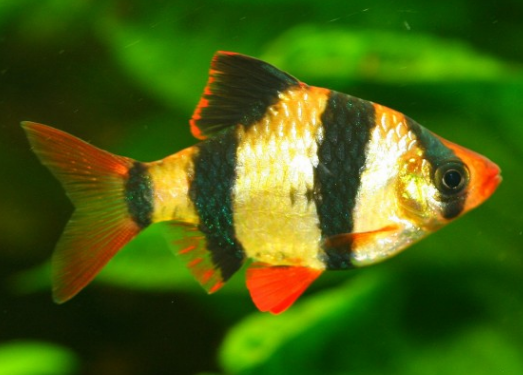
-

Tiger Barb Male & Female Tiger Barbs are a very popular addition for a tropical aquarium. The striking gold body with black vertical bars make them stand out in amongst tank mates. Being a barb, they are also a very hardy option.
Common Name(s) : Tiger Barb
Family : Cyprinidae
Genus: Puntigrus
Species : Puntigrus tetrazona
Origin : Borneo, Indonesia, Sumatra
PH : 6.5 – 7.5
Hardness : Soft to Hard
Temperature : 18 – 28°C / 64–82°F
Maximum Size : 7cm / 2.8 inches
Lifespan : 5 years
Aggression Level : Low-Medium (3.5/10)
Recommended Tank Size : 30 Litres +
Strata : Visits all areas
DESCRIPTION
The Tiger Barb can grow to about 7-10 centimeters long (2.75 – 4 inches) although they are often smaller when kept in an aquarium.
Native fish are silver to brownish yellow with four vertical black stripes and red fins and snout.
TANK SET UP
Provide rocks, large pieces of driftwood, live or fake plants etc for lots of cover
SUITABLE TANK MATES
- Angelfish
- Dwarf Cichlids
- Bristlenose
- Corydoras
- Danios
- Siamese Flying Fox
- Loaches
- Mollies
- Platys
- Rainbows
- Rasboras
- Sharks
- Silver Dollars
- Snails
- Swordtails
- Tetras
DIET
Omnivores – Frozen, Live, Flakes, Pellets, Vegetables
SEXING AND BREEDING
The tiger barb usually attains sexual maturity at a body length of 2.5 centimeters (1 inch) in total length, or at approximately six to seven weeks of age.
Males feature a bright red nose with a distinct red line above the black on their dorsal fins. The females are generally larger with a rounder belly and a mainly black dorsal fin.
Tiger barbs have been documented to spawn as many as 500 eggs per female (Scheurmann 1990; Axelrod 1992). Females can spawn at approximately two week intervals (Munro et al. 1990).
Tiger Barbs will readily breed in an aquarium. To successfully breed Tiger Barbs you might like to set up a separate densely planted tank and after the eggs have been scattered (up to 500 of them!!) the adults should be removed as Tiger Barbs have a tendency to eat their own eggs. Live plants such as Java Moss, Wisteria, even Ambulia are great suggestions for this purpose. These egg-layers tend to spawn several hundred eggs in the early morning in clumps of plants.
When the female Tiger Barb is ready to spawn, she will appear swollen (or “gravid”) with eggs. The males will circle and chase the females, repeatedly nudging her head and belly area. Eggs are usually deposited in groups of plants, and the pair will attempt to eat any that they are able to locate. For this reason it is suggested both parents be removed as they do not feature any maternal instincts.
The young hatch in 24 to 36 hours, depending on water temperature. The eggs will hatch in one to two days and the fry are free-swimming after two more days. The fry and can be fed frozen baby brine shrimp. After five weeks, the fry will be about 1 cm long.
OTHER USEFUL INFORMATION
As mentioned, Tiger Barbs do enjoy a densely planted aquarium. They can be a shy fish and will enjoy the cover of a canopy.
